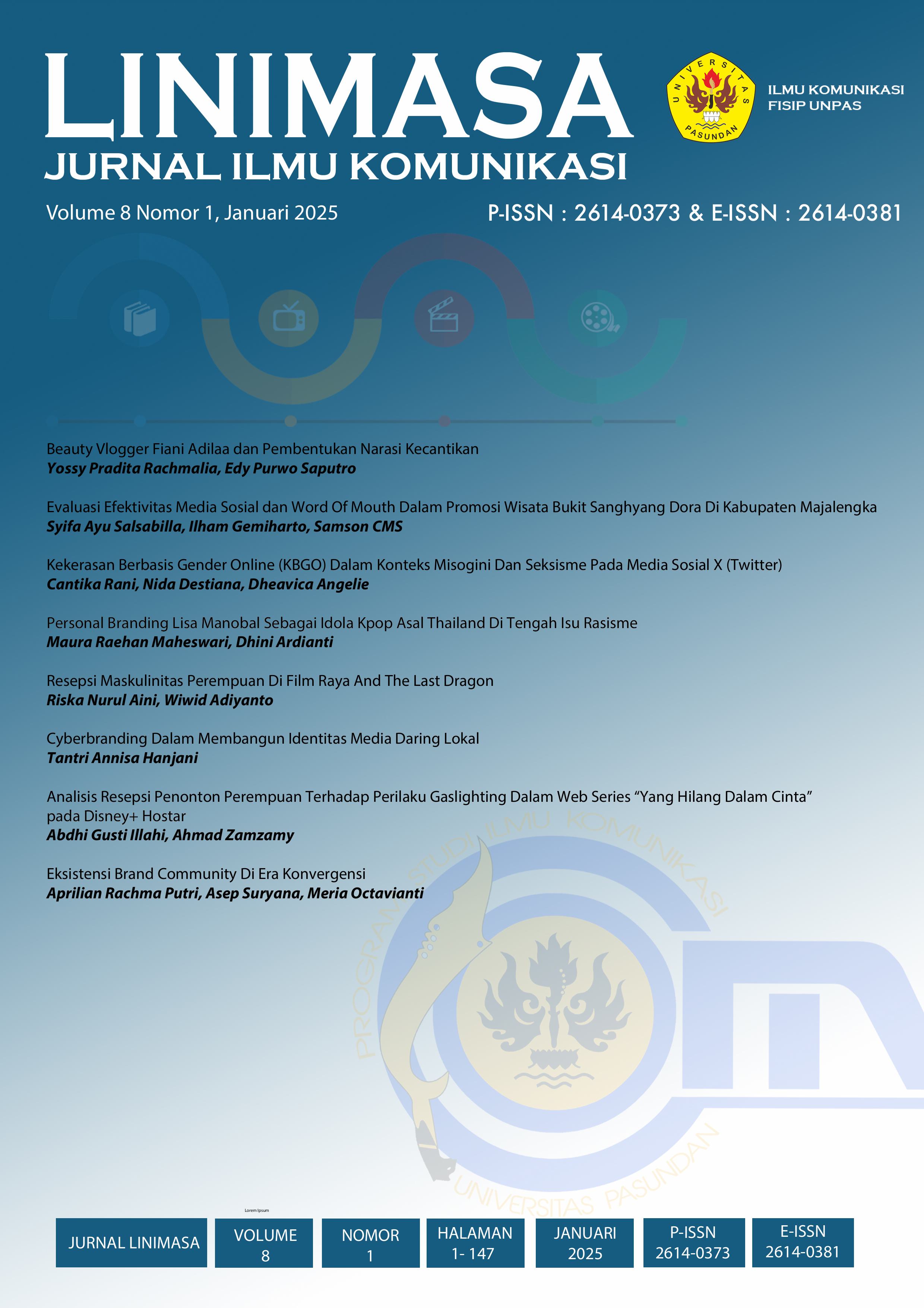KEKERASAN BERBASIS GENDER ONLINE (KBGO) DALAM KONTEKS MISOGINI DAN SEKSISME PADA MEDIA SOSIAL X (TWITTER)
DOI:
https://doi.org/10.23969/linimasa.v8i1.20646Keywords:
feminism, misogyny, Online gender-based violence (OBGV), Patriarchy, Social mediaAbstract
This study aims to determine how online gender-based violence (OBGV) occurs in the context of misogyny in the @gilbertkurnia1 account on social media X (Twitter). Using a descriptive qualitative research method using a virtual ethnography approach, this research seeks to present a description of the forms of communication included in the category of online gender-based violence (GBV) as a phenomenon of violence that is the object of this study. The data in this study were obtained using two methods, namely by observing the @gilbertkurnia1 Twitter account within the period of October 31 - December 06 2024 and using literature review that is relevant with the research topic to support the discussion in this study. The results of this study show that the content of tweets, retweets/reposts, replies, and quote tweets uploaded by the @gilbertkurnia1 account on X (Twitter) is content with topics of misogyny, gender violence, the use of sexist terms, hatred towards feminists, and the relationship of religion values toward gender context. The interactions carried out by @gilbertkurnia1 account through the tweets, replies, retweets or reposts, and quote tweet features on social media X (Twitter) can be analyzed as online gender-based violence (KBGO) in the context of misogyny, sexism, and objectification which are closely related to patriarchal culture. In his posts, @gilbertkurnia1 carries narratives that demean women such as the words “baby incubator”, “baby printer”, and “child printing vending machine”, as well as narratives that reflect hatred towards feminists such as the phrases “Feminist = bitch/slut”, “Feminist = loser”, and “Feminist = a single hole for everyone.”
Downloads
References
DAFTAR PUSTAKA
Andaru, I. P. N. (2021). Cyber Child Grooming sebagai Bentuk Kekerasan Berbasis Gender Online di Era Pandemi. Jurnal Wanita Dan Keluarga, 2(1), 41–51. https://doi.org/10.22146/jwk.2242
Arinahaten, M. A. (2021). PERTENTANGAN PEMIKIRAN ANTARA GERAKAN FEMINISME DAN ANTI-FEMINISME DI INDONESIA. Kusa Lawa, 1(2), 79–90. https://doi.org/10.21776/ub.kusalawa.2021.001.02.08
Christou, M., & Nabila, N. (2022). Feminism: The Forbidden label. Cadernos de Investigação Do Mestrado Em Negócio Eletrónico CIMNE, 2. https://doi.org/10.56002/ceos.0066_cimne_1_2
Fadli, M. R. (2021). Memahami desain metode penelitian kualitatif. HUMANIKA, 21(1), 33–54. https://doi.org/10.21831/hum.v21i1.38075
Febiola, N., Aritorang, A. I., & Budiana, D. (2023). REPRESENTASI PATRIARKI DALAM FILM “YUNI.” Scriptura, 12(2), 100–112. https://doi.org/10.9744/scriptura.12.2.100-112
Gultom, M. (2021). INDIKATOR KESETARAAN GENDER DAN ISU-ISU GENDER DI BIDANG PENDIDIKAN. Fiat Iustitia : Jurnal Hukum, 1–8. https://doi.org/10.54367/fiat.v1i2.1149
Irmayanti, N., & Grahani, F. O. (2023). Bersama Lawan Kekerasan Digital: Peran Orang Tua dan Teman Sebaya dalam Mengatasi Cyberviolance. Jurnal Psikologi : Jurnal Ilmiah Fakultas Psikologi Universitas Yudharta Pasuruan, 10(2), 296–304. https://doi.org/10.35891/jip.v10i2.4259
Julian, F. A., & Asmawati, W. O. (2024). Perempuan Dan Fenomena Kekerasan Berbasis Gender Online Dalam Media Sosial. RISOMA : Jurnal Riset Sosial Humaniora Dan Pendidikan, 2(2), 33–44. https://doi.org/10.62383/risoma.v2i2.64
Khairun, A. A., Equatora, M. A., Zulyadi, T., & Saputra, H. (2023). Penyuluhan Body Shaming di SMA Negeri 1 Darul Imarah Aceh Besar. Indonesian Journal of Community Services, 2(1), 5–8. https://doi.org/10.47540/ijcs.v2i1.802
Kharismawati, R. N. (2021). Perlindungan Kaum Perempuan dalam Perspektif Keislaman dan Keindonesiaan. Syariati : Jurnal Studi Al-Qur’an Dan Hukum, 7(2), 195–206. https://doi.org/10.32699/syariati.v7i2.2106
Margono, H., & Aprilia, F. N. (2024). Analisis Sentimen Komentar Childfree di Aplikasi X Menggunakan Naïve Bayes. Indonesian Journal of Computer Science, 13(3). https://doi.org/10.33022/ijcs.v13i3.3883
Maulida, H. (2021). Perempuan dalam Kajian Sosiologi Gender: Konstruksi Peran Sosial, Ruang Publik, dan Teori Feminis. Journal of Politics and Democracy, 1(1), 71–79. https://doi.org/10.61183/polikrasi.v1i1.6
Muhtadin, A. M. (2019). HADITS MISOGINIS PERSPEKTIF GENDER DAN FEMINISME. At-Tibyan, 2(2), 16–34. https://doi.org/10.30631/atb.v2i2.1
Mustika, S., Corliana, T., Tiara, A., & Amir, Y. (2023). Penguatan Pemahaman Kekerasan Berbasis Gender Online (KBGO) Bagi Guru-Guru SMA Muhammadiyah 3 Jakarta Selatan. Warta LPM, 68–74. https://doi.org/10.23917/warta.v26i1.800
Mutiah, R. (2019). SISTEM PATRIARKI DAN KEKERASAN ATAS PEREMPUAN. KOMUNITAS, 10(1), 58–74. https://doi.org/10.20414/komunitas.v10i1.1191
Nasution, M. R. N., Nursanti, S., & Lubis, F. M. (2024). Perilaku Toxic Masculinity di Kalangan Pelajar SMK. JKOMDIS : Jurnal Ilmu Komunikasi Dan Media Sosial, 4(2), 325–328. https://doi.org/10.47233/jkomdis.v4i2.1620
Praningrum, H. I. (2021). CITRA PEREMPUAN PADA CERPEN SEPASANG MATA YANG TERPENJARA DAN PEREMPUAN ITU PERNAH CANTIK. Lingua Franca:Jurnal Bahasa, Sastra, Dan Pengajarannya, 5(2), 174. https://doi.org/10.30651/lf.v5i2.7075
Prayoga, G. (2023). Critism of Toxic Masculinity in The Power Of The Dog Movie Based on Social Context. Social Science Studies, 3(6), 500–527. https://doi.org/10.47153/sss36.6802023
Pricillia, W. R. R., & Putri, LG. S. (2023). PEREMPUAN VOLUNTARY CHILDFREE: MELAWAN STIGMA DAN MENYOAL FEMININITAS DALAM MASYARAKAT PRONATALIS. Dharmasmrti Jurnal Ilmu Agama Dan Kebudayaan, 23(1), 89–104. https://doi.org/10.32795/ds.v23i1.4080
Putri, C. P. (2020). Perlindungan Hukum terhadap Hak Pekerja Perempuan Di Masa Pandemi Covid-19. Legalitas: Jurnal Hukum, 12(2), 226. https://doi.org/10.33087/legalitas.v12i2.210
Putri, L. R., Sudarsono, S. C., & Wardani, M. M. S. (2021). KEKERASAN VERBAL DALAM KOLOM KOMENTAR DI AKUN INSTAGRAM GARUDAREVOLUTION PADA BULAN SEPTEMBER 2019. Sintesis, 15(1), 32–56. https://doi.org/10.24071/sin.v15i1.3120
Rafael, A. M. D., & Pradhana, N. I. (2024). DEFAMASI IRIANA WIDODO MELALUI MISOGINI DAN DEFEMISME PEREMPUAN (KAJIAN LINGUISTIK FORENSIK). HINEF : Jurnal Rumpun Ilmu Pendidikan, 3(1), 103–118. https://doi.org/10.37792/hinef.v3i1.1192
Sakina, A. I., & A., D. H. S. (2017). MENYOROTI BUDAYA PATRIARKI DI INDONESIA. Share : Social Work Journal, 7(1), 71. https://doi.org/10.24198/share.v7i1.13820
Simaibang, E. W. A., & Bajari, A. (2019). Representasi Male Feminist oleh Aliansi Laki-laki Baru di Media Sosial. LINIMASA: JURNAL ILMU KOMUNIKASI, 2(2), 1. https://doi.org/10.23969/linimasa.v2i2.1685
Utoro, D. Y. S., Susetyo, S., & Ariesta, R. (2020). Kekerasan Verbal dalam Media Sosial Facebook. Silampari Bisa: Jurnal Penelitian Pendidikan Bahasa Indonesia, Daerah, Dan Asing, 3(2), 150–166. https://doi.org/10.31540/silamparibisa.v3i2.1013















